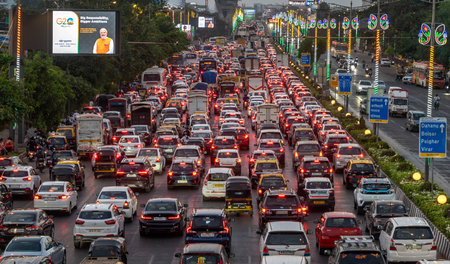1. Introduction: Navigating the Indian Traffic Maze
If you’ve ever found yourself on an Indian road during rush hour, you know it’s a unique experience that tests both your patience and driving skills. The air is thick with the sound of blaring horns, each one a different note in the daily symphony of traffic chaos. From autorickshaws to two-wheelers and city buses, every vehicle seems to have its own rhythm—honking to alert, warn, or sometimes just out of habit. It’s part of our culture, and honestly, it’s almost impossible to imagine Indian roads without this constant background music. However, as much as these horns are a part of our everyday life, they can sometimes escalate stress levels and contribute to confusion or accidents. In such an environment where everyone is in a hurry and roads are packed tighter than a Mumbai local train, ensuring safety and maintaining peace becomes more than just a personal need—it’s a community responsibility. That’s where smart solutions like Car Horn Alarms come into play, promising not only to protect us but also to bring some much-needed order to our streets.
2. The Meaning of the Horn in Indian Culture
In India, the car horn is not just a functional accessory—it’s almost like an extension of the driver’s personality. While in many countries honking is reserved for emergencies, here it forms a unique language on the road. Whether you’re navigating the narrow lanes of Old Delhi or waiting at a busy junction in Mumbai, the constant symphony of horns tells its own story. Honking becomes a way to say “I’m here”, “Move aside”, or even “Thank you”. It’s about communication, etiquette, and sometimes, pure survival in the sea of traffic chaos. The meaning behind each honk varies depending on context, vehicle type, and even region. Let’s break down how honking functions as communication in daily Indian traffic:
| Type of Honk | Typical Meaning | Common Scenarios |
|---|---|---|
| Quick Tap | Polite Alert | Overtaking, alerting pedestrians or bikers |
| Long Blast | Frustration/Warning | Traffic jams, someone blocking the way |
| Rhythmic Beeps | Signaling Presence | Narrow streets, blind corners, approaching intersections |
| No Honk (Rare) | Courtesy/Patience | Occasionally seen in gated communities or quieter towns |
This honking culture acts as both etiquette and survival tool—but can also spiral into chaos if overused. As much as it helps keep everyone aware and safe amidst unpredictable movements, excessive honking leads to noise pollution and stress for drivers and residents alike. For many Indians, learning to interpret these sounds becomes second nature—an essential skill for navigating everyday traffic with safety and peace in mind.
![]()
3. Challenges Posed by Traffic Jams
If you have ever been stuck in a typical Indian traffic jam, you know it’s not just about waiting; its a test of patience, nerves, and sometimes even your sanity! Our roads are packed with everything from autos and scooters to big lorries and the occasional bullock cart. Common triggers for these jams include narrow lanes, sudden roadblocks, unpredictable pedestrians, and, lets be honest, our famous “chalta hai” attitude when it comes to following traffic rules.
For daily commuters, this chaos can quickly become overwhelming. Imagine being late for work or an important event because traffic is crawling at a snail’s pace. The constant honking—often more like a background score than a warning—adds to the stress. It’s not just noise; it feels like a pressure cooker inside your car or on your bike. Over time, this relentless soundscape starts affecting mental well-being. Many drivers report feeling anxious, irritable, or even helpless during peak hours.
But the impact goes beyond individuals. When everyone is frustrated and continuously honking, urban peace takes a real hit. Neighborhoods close to busy intersections rarely enjoy moments of quiet. Kids studying for exams, elderly folks trying to rest, and anyone working from home all struggle to focus as horns blare outside their windows. This is why solutions like Car Horn Alarm are so relevant—it’s not just about controlling noise but also about restoring some much-needed calmness to our bustling cities.
4. Car Horn Alarms: A Practical Solution
In the chaos of Indian roads, especially during peak traffic hours, the constant blaring of horns can be overwhelming. However, car horn alarms present a practical solution that balances safety and peace without adding to the relentless noise pollution. Let’s take a closer look at how these systems function and why they’re gaining popularity in India.
What is a Car Horn Alarm?
A car horn alarm is an innovative system that integrates traditional vehicle security with intelligent sound management. Unlike regular car alarms or panic honking, these alarms are designed to alert only when there is a genuine threat to your vehicle, such as attempted theft or forced entry, rather than continuous unnecessary honking.
How Do Car Horn Alarms Work?
Car horn alarms come equipped with sensors that detect unusual movements or vibrations around the vehicle. When triggered, the alarm emits a distinctive pattern of honks, alerting the owner and nearby people to potential trouble. This targeted approach ensures effective communication without contributing to the usual cacophony of Indian traffic.
Key Features of Car Horn Alarms
| Feature | Description | Indian Relevance |
|---|---|---|
| Intelligent Sensors | Senses unauthorized movement or impact | Helps prevent thefts in crowded areas like markets and parking lots |
| Distinctive Sound Patterns | Uses specific honk sequences for alarms vs normal use | Makes it easy for owners to differentiate between casual honking and real threats |
| Noise Control | Avoids excessive or false triggers to minimize noise pollution | Keeps streets quieter while still ensuring safety in cities like Mumbai or Delhi |
| User-Friendly Controls | Easy activation/deactivation through remote or smartphone apps | Catered to tech-savvy urban Indians who want convenience on-the-go |
The Role of Car Horn Alarms in Indian Traffic Culture
Unlike traditional car alarms that can go off randomly and add to the stress of daily commutes, car horn alarms act as responsible guardians. They respect the need for audible warnings in emergency situations while helping reduce unnecessary noise—a crucial step towards safer and more peaceful Indian roads.
5. Benefits: Ensuring Safety and Restoring Harmony
If you have ever been stuck at a busy Indian junction during peak hours, you know the chaos that comes with blaring horns from all directions. With a Car Horn Alarm system in place, there are some real benefits that go beyond just reducing noise pollution. First, it can significantly reduce accidents. Imagine a scenario at a Delhi traffic signal where drivers tend to jump the red light due to impatience. A smart horn alarm can alert them with a unique tone if another vehicle is about to cross their path or if they are too close to the car ahead. This instant warning gives everyone enough time to react, preventing those typical bumper-to-bumper nudges we see so often.
Secondly, driver awareness gets a big boost. In our daily rush—whether you’re trying to reach your office in Bengaluru’s Outer Ring Road or navigating Mumbai’s narrow lanes—the constant honking makes it easy to tune out important sounds. A Car Horn Alarm with intelligent alerts ensures that only genuine warnings get attention, helping drivers stay more focused and less stressed on the road. For instance, if someone tries to overtake dangerously from the left (something we all witness!), the alarm can specifically notify both drivers, allowing for safer maneuvering without unnecessary drama.
Finally, bringing calm and harmony back to our roads is something every Indian commuter dreams of. Instead of endless angry honks during wedding processions or festival parades, these alarms promote respectful driving habits. People start using their horns for actual emergencies rather than expressing frustration. Over time, this shift can help restore a sense of peace on busy roads—from Chennai’s bustling Mount Road to Pune’s crowded chowks—making our daily commutes less stressful and even more enjoyable.
6. Tips for Mindful Honking in India
Driving on Indian roads means adapting to a symphony of sounds, especially the ever-present car horn. While honking is often necessary to alert others and ensure safety amidst chaotic traffic, overuse can add to stress and confusion. Here are some practical and culturally-sensitive tips for using your car horn responsibly, keeping both safety and courtesy in mind:
Use Horn as a Warning, Not an Expression of Frustration
In India, it’s common for drivers to use the horn liberally. However, try to reserve honking for alerting other road users to your presence—like when overtaking, approaching blind turns, or when someone hasn’t noticed a traffic light change. Avoid using the horn just to vent frustration; it rarely improves the situation.
Respect Quiet Zones and Night Hours
Certain areas like hospitals, schools, and residential zones are marked as ‘No Honking’ zones. Being mindful of these signs not only follows local laws but also shows respect for the peace of others, especially during late-night hours when unnecessary noise can disturb sleep or cause anxiety.
Communicate Clearly but Briefly
If you need to use your horn, keep it short—a quick beep is enough in most situations. Prolonged or repeated honking can come off as aggressive and might escalate tension among fellow drivers or pedestrians.
Be Patient During Traffic Jams
Indian traffic jams are legendary! Instead of joining the chorus of impatient horns, practice patience. Remember that constant honking won’t clear the jam any faster—it only adds to everyone’s stress levels.
Acknowledge Local Customs with Courtesy
Honking can sometimes be a way of saying “thank you” or “excuse me” on Indian roads. If someone gives way or helps you navigate through tight spaces, a gentle tap on the horn paired with a smile or hand wave goes a long way in spreading goodwill.
Balance Safety and Consideration
Your horn is an important safety tool but should be used with consideration for others’ comfort and well-being. Mindful honking keeps everyone alert without contributing to noise pollution—helping maintain both safety and peace in India’s bustling traffic.
7. Conclusion: Towards a Quieter, Safer Road Experience
As we all know, Indian roads are famous for their symphony of honks and the daily hustle-bustle. While using the horn has become second nature to us—whether it’s navigating through narrow lanes in Chandni Chowk or waiting at a long signal in Bengaluru—its time we rethink how we use this tool. By embracing smarter horn habits, each of us can contribute to reducing unnecessary noise pollution and create a more peaceful environment for everyone on the road. Technologies like Car Horn Alarms are not just innovative, but they also offer an extra layer of safety by ensuring that horns are used judiciously and only when truly necessary. Imagine a drive where you don’t feel your blood pressure rise with every honk, but instead experience smoother traffic flow and better communication among drivers. Let’s encourage our friends and family to be more mindful, adopt these smart technologies, and set an example for others. Together, we can move towards a quieter, safer everyday commute, making our journeys not just convenient but also enjoyable. Remember, real change starts with small steps—so let’s take the first one today for ourselves and for our incredible India!


